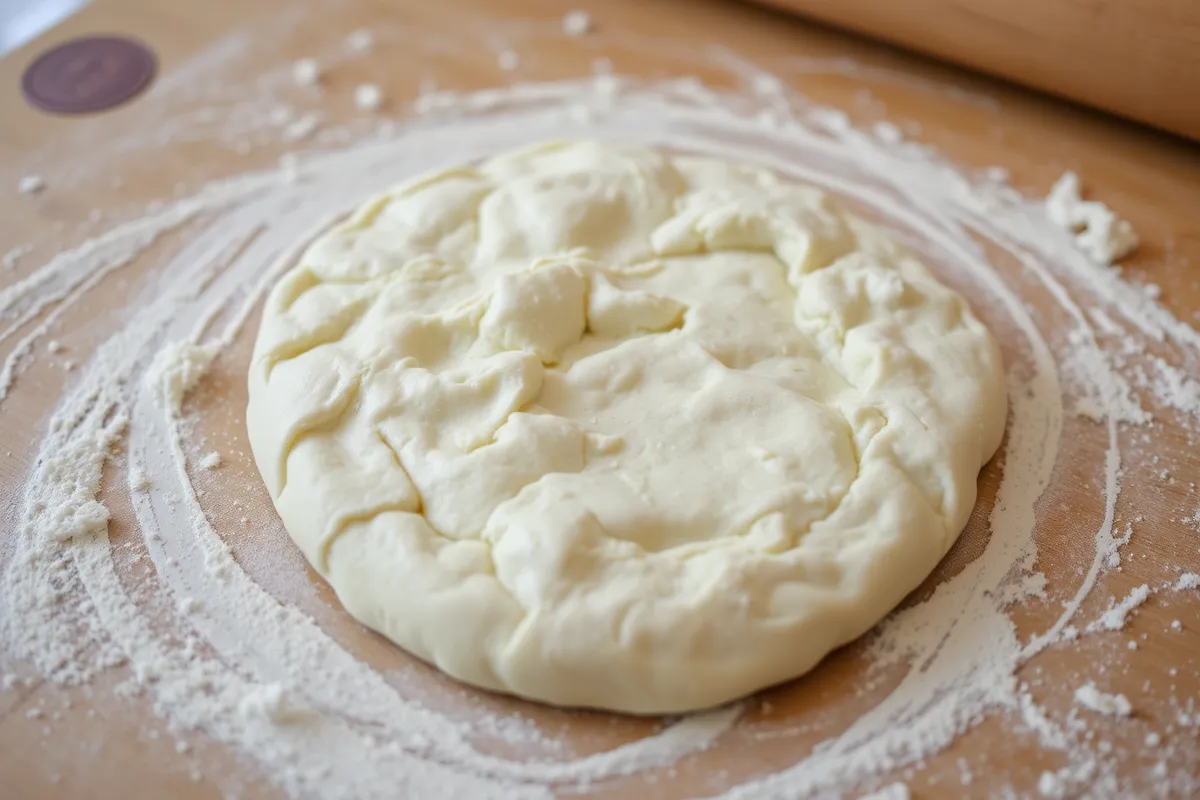Making the perfect pizza begins with the dough. But what kind of dough is good for pizza, you might ask? Whether you love pizza or are just starting to cook, understanding the different options is key. This guide will help you make the best pizza at home.
We’ll cover everything from Neapolitan to New York-style crusts. You’ll learn about ingredients, techniques, and expert tips. Soon, you’ll be making pizzas that everyone will love.
Understanding the Fundamentals of Pizza Dough Making
Making the perfect homemade pizza dough is all about knowing the basics. A great pizza starts with a dough that tastes good and holds its shape. Let’s look at the key steps to making the best dough.
Basic Ingredients for Perfect Pizza Dough
The ingredients for pizza dough are simple but important. A good recipe includes:
- Flour: This is the dough’s base, giving it structure and texture. Choose high-quality homemade pizza dough or pizza dough recipe for the best results.
- Water: The right amount of water is key for the dough’s consistency. It affects the dough’s texture and rise.
- Yeast: Yeast makes the dough rise, giving it an airy and chewy texture.
- Salt: A little salt adds flavor, balancing the sweetness and enhancing other tastes.
The Role of Gluten Development
Gluten is a protein in wheat flour that’s vital for dough. Kneading develops gluten, making the dough strong and elastic. This is crucial for a perfect crust that’s chewy yet crispy.
Temperature and Environment Factors
The temperature and environment when making pizza dough matter a lot. Keeping the right temperature helps yeast work well and ensures even rising. The humidity and air flow also affect the dough’s texture, so consider these when making your pizza dough recipe.
What is the best dough for making pizza?
Choosing the right dough is key to a perfect pizza. Whether you like Neapolitan, New York-style, or deep-dish, each has its own charm. The dough’s type can change the pizza’s taste and feel.
Neapolitan dough is light and airy, with a crispy crust. It’s made from flour, water, yeast, and salt. The dough ferments for a long time, making it delicate yet flavorful.
New York-style dough is chewy and foldable, with crispy edges. It has more yeast and oil, giving it a unique snap and chewiness.
- Which dough works best for pizza? The best dough depends on your taste and pizza style.
- Best pizza dough is a matter of personal choice. Neapolitan and New York-style are favorites for many.
The best pizza dough is the one that meets your pizza dreams and tastes. Try different doughs to find your favorite. This will make your homemade pizzas even better.
Traditional Neapolitan Pizza Dough: The Gold Standard
The traditional Neapolitan pizza dough is considered the best. It comes from Naples, Italy, and is known for its thin, crispy crust. This crust is also chewy, making it a favorite among pizza lovers.
To make this dough, you need to know authentic Italian techniques. You also need to get the hydration and fermentation just right.
Authentic Italian Techniques
The secret to great Neapolitan pizza dough is in the traditional Italian methods. These methods include hand-stretching the dough with a rolling pin. This makes the crust thin and airy.
The dough is then tossed and stretched to get the perfect shape. This ensures the crust is even and has a delicate crunch.
Perfect Hydration Levels
What makes Neapolitan dough special is its hydration level. It contains a lot of water, which makes it soft and supple. This high water content helps the gluten develop fully.
This results in a dough that is chewy and elastic. It has the perfect crumb structure.
Fermentation Time Requirements
The fermentation process is also key to making great Neapolitan pizza dough. The dough ferments for 12 to 24 hours. Some recipes even call for 48 hours.
This long fermentation time helps develop complex flavors. It also makes the crust delicate yet sturdy.
By mastering the traditional Neapolitan techniques, keeping the hydration right, and allowing for proper fermentation, bakers can make a dough that truly captures the essence of this iconic Italian style.
New York-Style Pizza Dough Characteristics
New York-style pizza is a favorite worldwide. Known for its thin, crispy crust and slightly chewy texture, the secret lies in the ingredients and the careful preparation.
High-gluten flour, or “bread flour,” is at the dough’s core. It has more protein, which makes the dough strong. This allows for a crust that’s crisp and foldable.
Yeast is another key ingredient. Many prefer active dry yeast for its slow action. It adds a sweet flavor and a hint of tanginess.
| Ingredient | Quantity |
|---|---|
| Bread Flour | 3 cups (375g) |
| Active Dry Yeast | 1 teaspoon (4g) |
| Salt | 1 teaspoon (6g) |
| Warm Water | 1 1/4 cups (300ml) |
| Olive Oil | 1 tablespoon (15ml) |
The dough is left to ferment for a long time, usually 24 hours or more. This makes the dough flavorful and chewy, just like a New York-style crust.
Whether you’re new to making pizza or an expert, knowing about New York-style dough is key. It helps you make amazing homemade pizza in your kitchen.
Comparing Different Flour Types for Pizza Making
Choosing the right flour is key to making the best pizza dough. Each flour type has its own special qualities. These can help you create a pizza crust that’s both crispy and chewy.
00 Flour vs. All-Purpose Flour
00 flour is a finely ground Italian flour. It’s known for making a light and airy crust. It has more protein than all-purpose flour, which makes the dough stronger and more stretchy.
This is great for traditional Neapolitan-style pizzas. The crust needs to be thin and stretchy without tearing.
Bread Flour Benefits
Bread flour has even more protein than 00 flour. This means the crust will be chewier and more resilient. It’s a favorite for New York-style pizza, where a thicker crust is preferred.
Whole Wheat Options
- Whole wheat flour is a healthier choice for best pizza dough. It imparts a nutty essence and a more substantial consistency.
- When using whole wheat flour, you’ll need to adjust the dough’s hydration and proofing time. This is because whole wheat dough behaves differently.
The right flour for your types of pizza dough depends on your taste and pizza style. Try different flours to find the perfect mix of flavor, texture, and versatility for your homemade pizzas.
The Science Behind Pizza Dough Fermentation
Making the perfect pizza dough is an art. Knowing the science of fermentation is key. It makes your dough taste better, feel softer, and be easier to digest.
Yeast is at the center of dough fermentation. It eats the sugars in the flour. This process makes the dough smell great and feel chewy.
The time and temperature of fermentation matter a lot. Longer, cooler fermentation makes the dough taste more complex. Shorter, warmer fermentation makes it taste yeasty.
The flour you use affects fermentation too. Bread flour makes dough stretchy and elastic, perfect for pizza crusts. All-purpose flour makes dough tender but not as sturdy.
| Fermentation Method | Flavor Profile | Crust Texture |
|---|---|---|
| Cold Fermentation | Complex, nuanced | Chewy, crisp |
| Warm Fermentation | Pronounced yeast flavor | Tender, delicate |
Understanding dough fermentation lets everyone make better pizza dough. It’s a way to create a dish that’s not just tasty but also satisfying.
Quick vs. Slow-Rise Pizza Dough Methods
The rise time significantly affects the quality of the pizza crust. Learn about quick and slow-rise methods to determine the best fit for your recipe and taste.
24-Hour Cold Fermentation Benefits
Slow-rise dough, fermented for 24 hours in the cold, has many benefits. It develops gluten fully, making the crust chewy and flavorful. This slow process also brings out complex flavors, adding sweetness and acidity that enhance the pizza.
Same-Day Dough Techniques
If you’re short on time, same-day dough is a quick option. It ferments for just a few hours, letting you bake your pizza in one day. Though it lacks the depth of slow-rise dough, it still yields a tasty crust with a lighter texture.
| Characteristic | 24-Hour Cold Fermentation | Same-Day Dough |
|---|---|---|
| Fermentation Time | 24 hours | 2-4 hours |
| Crust Texture | Chewy and flavorful | Lighter and airier |
| Flavor Profile | Complex, with notes of sweetness and acidity | Simpler, more straightforward flavors |
| Preparation Time | Longer, but with less active work | Quicker, but requires more active involvement |
Choose between the rich flavors and chewy texture of slow-rise dough or the quick convenience of same-day dough. Knowing the differences will help you make the perfect pizza crust every time.
You May Also Like:
- Easy Gluten Free Blueberry Peach Cobbler
- Pecan Chocolate Fudge Recipe – Easy and Homemade
- How Do Chinese Restaurants Make Fried Rice Yellow?
Common Pizza Dough Mistakes to Avoid
Making perfect pizza dough is a delicate task. Even experienced cooks can make common mistakes. One big error is overworking the dough, which makes it tough and chewy. It’s important to knead it just until it’s smooth and elastic, without overdoing it.
Another mistake is getting the dough’s moisture wrong. The right amount of moisture is key for the perfect texture and rise. Should the mixture lack sufficient moisture, it will result in a fragmented texture. Too wet, and it becomes soggy and hard to handle. Measuring water carefully is crucial for your homemade pizza dough.
Finally, not giving the dough enough time to proof can ruin it. Whether you’re going for a quick rise or a slow 24-hour cold fermentation, time is essential. Rushing this step can result in a dense, flat pizza. If you’re buying dough, choose the best pizza dough to buy that fits your taste and crust preference.
Frequently Asked Questions (FAQs)
What kind of dough is good for pizza?
The top doughs for pizza are Neapolitan, New York-style, and deep-dish. Each has its own unique texture and taste. Your choice depends on what kind of pizza you like to make.
What is the best pizza dough to buy?
Look for high-quality, pre-made dough with simple ingredients. Avoid doughs with too many preservatives. Making your own dough with good flour, yeast, water, and salt is often the best choice. For more information, read this article.
What is the best homemade pizza dough recipe?
The best homemade dough recipe depends on your crust preference. Neapolitan dough uses 00 flour, while New York-style might use all-purpose flour. Try different recipes to find your favorite.
What are the different types of pizza dough?
Common dough types include Neapolitan, New York-style, deep-dish, and thin-crust. Each has its own texture, taste, and cooking method. The flour type, hydration, and fermentation time all affect the dough.
How do you make the best pizza dough?
To make great pizza dough, focus on a few key things:
– Use high-quality, high-protein flour (like 00 or bread flour)
– Develop the gluten well through kneading or stretch-and-fold
– Get the right hydration level, usually 60-70% for most doughs
– Let the dough ferment for enough time, from a few hours to 24-48 hours
– Control the temperature and environment while making the dough

